高中情态动词用法解析
- 格式:ppt
- 大小:235.00 KB
- 文档页数:27

高中英语语法Modal Verb(情态动词)情态动词表示说话人的某种情感表态:(1)can表示能力,意为“会”“能”例:He can speak English now.他现在能说英语了。
(2)can表示“允许”或“请求允许”,意为“可以”例:can I use your phone?我可以用一下你的电话吗?(3)can表示说话人的猜测,用来表示惊讶,怀疑,不相信等态度,主要用于否定句和疑问句。
例:I believe that she can`t be so careless.(对现在进行推测)我相信她不会如此粗心。
例:What can he be being ?(对现在发生的事进行推测)他会在干什么?例:The ground isn`t wet, it can`t have rained last night.(对过去发生的事进行推测)地面未湿,昨晚上肯定没下雨。
Be able to表示“能力”,如果只表示能力时,两者都可用,但若表示经历一定的挫折打击,终于能够怎么样,过去的能力+特定行为时,则要用 was/were able to(1)现在时,两者皆可能,例:I can/am able to swim 我会游泳。
(2)用于表示过去的能力,两者皆可用。
例:When he was three he could/wasable to swim.当他3岁就会游泳了。
(3)表示将来的能力不能用can, The baby will be able to walk in a few weeks.这个婴儿用了几个星期就会走路了。
(4)他能够而且的确去了,只能用was able to. His mother wasn`t at home, sohe was able to go to see the film. 他的妈妈不在家,因此他就去看电影了。
(5)Be able to 还可以用于完成时态,而can不能。
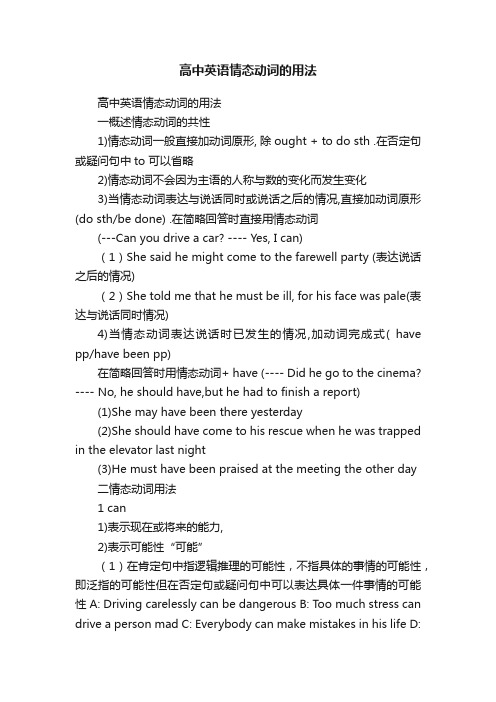
高中英语情态动词的用法高中英语情态动词的用法一概述情态动词的共性1)情态动词一般直接加动词原形, 除ought + to do sth .在否定句或疑问句中to 可以省略2)情态动词不会因为主语的人称与数的变化而发生变化3)当情态动词表达与说话同时或说话之后的情况,直接加动词原形(do sth/be done) .在简略回答时直接用情态动词(---Can you drive a car? ---- Yes, I can)(1)She said he might come to the farewell party (表达说话之后的情况)(2)She told me that he must be ill, for his face was pale(表达与说话同时情况)4)当情态动词表达说话时已发生的情况,加动词完成式( have pp/have been pp)在简略回答时用情态动词+ have (---- Did he go to the cinema? ---- No, he should have,but he had to finish a report)(1)She may have been there yesterday(2)She should have come to his rescue when he was trapped in the elevator last night(3)He must have been praised at the meeting the other day二情态动词用法1 can1)表示现在或将来的能力,2)表示可能性“可能”(1)在肯定句中指逻辑推理的可能性,不指具体的事情的可能性,即泛指的可能性但在否定句或疑问句中可以表达具体一件事情的可能性 A: Driving carelessly can be dangerous B: Too much stress can drive a person mad C: Everybody can make mistakes in his life D:There being too much snow on a highway can lead to accidents (2)在否定句中表示“不可能”A: He can?t be hungry B: She can?t have been criticized at last week?s meeting C: She can?t possibly be tired(3)在疑问句中表示“可能吗?”A: Can she have been to the scenic spot last Friday?(4)S + can have (been)+ pp表示“可能已发生某事”,一般用在否定句或疑问句,如: Can she have been to the scenic spot last Friday? (5)在肯定句中还可以表示“有时可能” A: Scotland can be very cold in winter B: He is a bad-tempered guy, but he can be quite charming when he wishes C: You can be very annoying总之can表示可能性“可能”时可以用在肯定句、否定句和疑问句中。
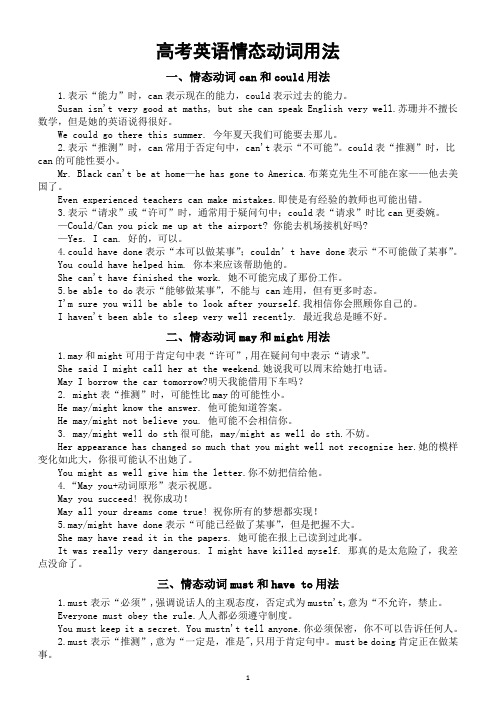
高考英语情态动词用法一、情态动词can和could用法1.表示“能力”时,can表示现在的能力,could表示过去的能力。
Susan isn't very good at maths, but she can speak English very well.苏珊并不擅长数学,但是她的英语说得很好。
We could go there this summer. 今年夏天我们可能要去那儿。
2.表示“推测”时,can常用于否定句中,can't表示“不可能”。
could表“推测”时,比can的可能性要小。
Mr. Black can't be at home—he has gone to America.布莱克先生不可能在家——他去美国了。
Even experienced teachers can make mistakes.即使是有经验的教师也可能出错。
3.表示“请求”或“许可”时,通常用于疑问句中;could表“请求”时比can更委婉。
—Could/Can you pick me up at the airport? 你能去机场接机好吗?—Yes. I can. 好的,可以。
4.could have done表示“本可以做某事”;couldn’t have done表示“不可能做了某事”。
You could have helped him. 你本来应该帮助他的。
She can't have finished the work. 她不可能完成了那份工作。
5.be able to do表示“能够做某事”,不能与 can连用,但有更多时态。
I'm sure you will be able to look after yourself.我相信你会照顾你自己的。
I haven't been able to sleep very well recently. 最近我总是睡不好。
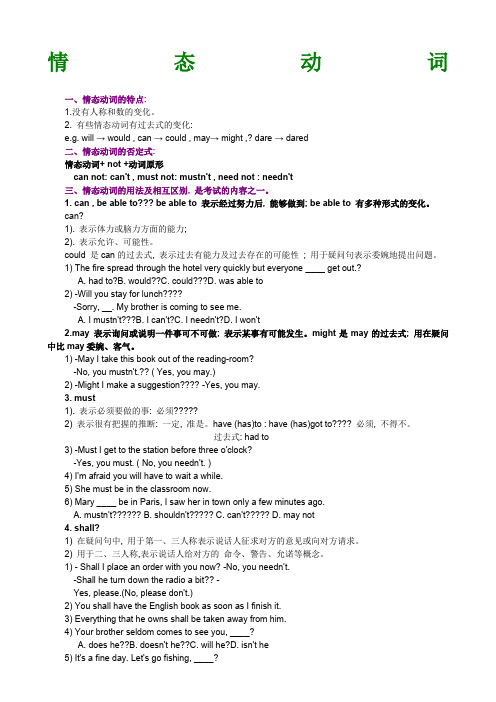
情态动词一、情态动词的特点:1.没有人称和数的变化。
2. 有些情态动词有过去式的变化:e.g. will → would , can → could , may→ might ,? dare → dared二、情态动词的否定式:情态动词+ not +动词原形can not: can't , must not: mustn't , need not : needn't三、情态动词的用法及相互区别, 是考试的内容之一。
1. can , be able to??? be able to 表示经过努力后, 能够做到; be able to 有多种形式的变化。
can?1). 表示体力或脑力方面的能力;2). 表示允许、可能性。
could 是can的过去式, 表示过去有能力及过去存在的可能性; 用于疑问句表示委婉地提出问题。
1) The fire spread through the hotel very quickly but everyone ____ get out.?A. had to?B. would??C. could???D. was able to2) -Will you stay for lunch????-Sorry, __. My brother is coming to see me.A. I mustn't???B. I can't?C. I needn't?D. I won't2.may 表示询问或说明一件事可不可做; 表示某事有可能发生。
might是may的过去式; 用在疑问中比may委婉、客气。
1) -May I take this book out of the reading-room?-No, you mustn't.?? ( Yes, you may.)2) -Might I make a suggestion???? -Yes, you may.3. must1). 表示必须要做的事: 必须?????2) 表示很有把握的推断: 一定, 准是。

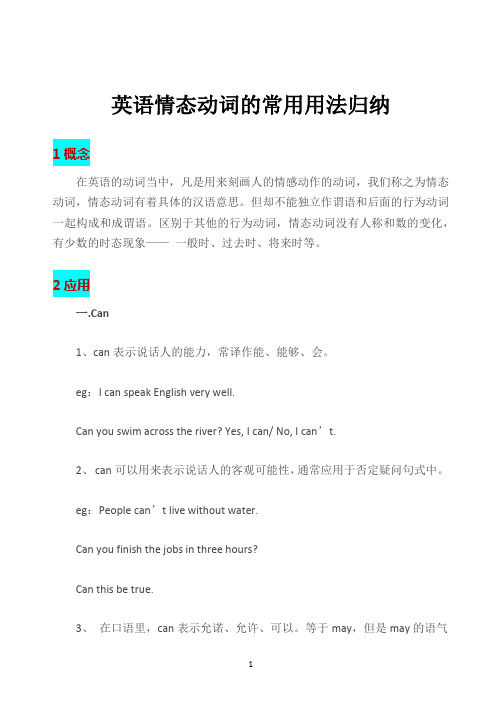
英语情态动词的常用用法归纳1概念在英语的动词当中,凡是用来刻画人的情感动作的动词,我们称之为情态动词,情态动词有着具体的汉语意思。
但却不能独立作谓语和后面的行为动词一起构成和成谓语。
区别于其他的行为动词,情态动词没有人称和数的变化,有少数的时态现象——一般时、过去时、将来时等。
2应用一.Can1、can表示说话人的能力,常译作能、能够、会。
eg:I can speak English very well.Can you swim across the river? Yes, I can/ No, I can’t.2、can可以用来表示说话人的客观可能性,通常应用于否定疑问句式中。
eg:People can’t live without water.Can you finish the jobs in three hours?Can this be true.3、在口语里,can表示允诺、允许、可以。
等于may,但是may的语气重于can。
eg:Can I come in? = May I come in?Can I use your bike? = May I use your bike ?*表示允许可以may mightcould can4、在“过去时”的语境里,通常用could 表示它的过去式,用be able to 短语(was/were)而could通常用来在一般现在时的语境里表示委婉语气eg:Could(can)you show me the way to the supermarket?5、can表示猜测(1)对现在状态的一种猜测,只能用在否定疑问句中。
eg:Zhang can’t be ill really?This can’t be done by him.(2)对现在动作的猜测eg: The boy can’t be telling lies.Mary works so hard, now, she can’t be sleeping.(3)对过去动作的一种猜测eg:He can’t have gone to the bookshop yesterday.Mother couldn’t have said it.6、can(could)惯用法(1)can’t wait to do 迫不及待做…….eg: Children can’t wait to eat apples in the basket.(2)can’t help doing 情不自禁做某事。

高中英语语法讲解:情态动词概述1.共有10个情态动词:can/could, may/might, will/would, shall, should, ought to, must;2个半情态动词need, dare2.特点:(1)情态动词后加动词原形(即不带to的不定式)一起构成谓语;(2)没有人称和数的变化;(3)多数情态动词有过去式,但其过去式有时并不表示时态,而只起“委婉或不确定语气”的作用。
Would you do me a favour? She may/might be watering the flowers now.3.情态动词在句子中可发挥不同作用,如表能力,表责任与义务,表推测,表征求允许,表请求,表建议,表语气态度等等He can/could run 100 meters in 11 seconds.You should/ought to/must work hard to win a gold medal.Can/Could/May/Might I watch the Olympics tonight?Will/Can/Could/Would you help me with my training?He might/may/could/should/ought to/will/must watch the football match tonight.I suggest that you should watch the opening ceremony.Can this be true?4.情态动词+do 表对一般现在或将来情况的推测情态动词+ be doing 表对正在发生的事情的推测情态动词+have done 表对过去已经发生的事情的推测一、can/could 的用法1.表能力(1) can do现在一般的能力(2) could do过去一般的能力(3) could have done过去有能力做但没做具体某事(4)was/were able to do = managed to do/ succeeded in doing 过去有能力做且做了具体某事。


情态动词高中知识点高三情态动词是一类具有特殊意义和用法的动词,它们在句子中一般与实义动词连用,表示说话人的推测、命令、请求、建议等情态。
在高中英语学习中,掌握情态动词的正确用法至关重要。
本文将介绍情态动词的相关知识点,帮助高三学生更好地运用这一语法现象。
一、情态动词的定义情态动词,又称情态助动词,是用来表示说话人对某种动作或状态的态度、推测、可能性、能力、意愿、义务等情态的一类特殊动词。
常见的情态动词包括can、could、may、might、must、shall、should、will、would等。
二、情态动词的用法1. 表示能力情态动词can表示某人具有能力或可能做某事,could用于过去说法。
例如:- She can speak three languages fluently.(她能说流利的三种语言)- He could lift the heavy boxes when he was younger.(他年轻时能搬起这些沉重的箱子)2. 表示推测和可能性情态动词may、might、could用于表示推测和可能性。
may用于表示较为肯定的推测,might和could表示推测的可能性较小。
例如:- The weather is cloudy, it may rain later.(天气多云,可能会下雨)- He might be late for the meeting.(他可能会迟到会议)3. 表示义务和建议情态动词must表示说话人对某种行为具有强烈的责任感或坚决要求,should表示建议。
例如:- We must obey the laws of the country.(我们必须遵守国家的法律)- You should apologize to your friend for your mistake.(你应该为你的错误向朋友道歉)4. 表示许可和请求情态动词can、may、could用于表示允许和请求。

情态动词知识点总结高中情态动词是英语中一个重要的语法现象,它们能够表达说话者的情感、态度、意愿等,以及表达说话者对事件的推测、猜测、可能性等。
了解情态动词的用法,能够帮助我们更准确地表达自己的意思,也有助于我们理解他人的意图。
本文将对情态动词的概念、用法、以及常见的情态动词进行总结和归纳,以便于读者更深入地理解情态动词的使用。
一、情态动词的概念情态动词(Modal Verb)是一类特殊的助动词,用来表示说话者的情感、态度、意愿等,以及表达说话者对事件的推测、猜测、可能性等。
情态动词通常用于句子的前面,后面跟动词原形,用来构成不同的语法结构和表达不同的含义。
英语中常见的情态动词有can、could、may、might、must、shall、should、will、would、ought to等。
这些情态动词具有一些共同的特点,比如不能独立完成谓语,后面必须跟动词原形;在疑问句和否定句中,情态动词的位置要发生变化等。
二、情态动词的用法1. 表示能力和可能性can与could表示说话者的能力或者对某种事情的可能性,其中can用于现在时,could用于过去时。
比如:I can speak Spanish.(我会说西班牙语。
)She could swim when she was five.(她五岁的时候就会游泳。
)may与might也表示可能性,may 用于现在时,might 用于过去时。
比如:It may rain tomorrow.(明天可能会下雨。
)I thought she might come.(我以为她可能会来。
)2. 表示请求和建议will与would可以表示请求,will用于肯定句,would用于否定句和疑问句。
比如:Will you please help me?(你能帮帮我吗?)I would like to go with you.(我想和你一起去。
)shall与should也可以表示请求或者建议,should更多地表示建议。
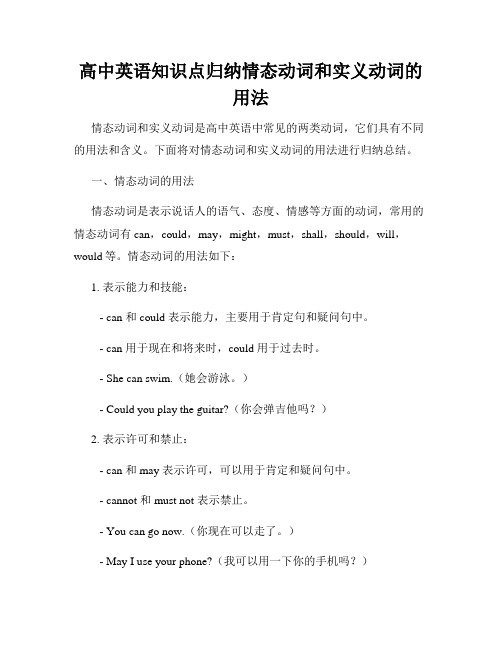
高中英语知识点归纳情态动词和实义动词的用法情态动词和实义动词是高中英语中常见的两类动词,它们具有不同的用法和含义。
下面将对情态动词和实义动词的用法进行归纳总结。
一、情态动词的用法情态动词是表示说话人的语气、态度、情感等方面的动词,常用的情态动词有can,could,may,might,must,shall,should,will,would等。
情态动词的用法如下:1. 表示能力和技能:- can 和 could 表示能力,主要用于肯定句和疑问句中。
- can 用于现在和将来时,could 用于过去时。
- She can swim.(她会游泳。
)- Could you play the guitar?(你会弹吉他吗?)2. 表示许可和禁止:- can 和 may 表示许可,可以用于肯定和疑问句中。
- cannot 和 must not 表示禁止。
- You can go now.(你现在可以走了。
)- May I use your phone?(我可以用一下你的手机吗?)- You must not smoke here.(你不能在这里抽烟。
)3. 表示推测和可能性:- may,might 和 could 表示可能性,可用于肯定和疑问句中。
- may 和 might 可用于现在和将来时,could 可用于过去时。
- He may come tomorrow.(他明天可能来。
)- Could it be true?(这可能是真的吗?)4. 表示义务和建议:- must 和 have to 表示义务,表示说话人的主观意愿。
- should 和 ought to 表示建议或期望。
- We must finish our homework.(我们必须完成作业。
)- You should see a doctor.(你应该去看医生。
)二、实义动词的用法实义动词是指具有实际意义的动词,用来表示具体的动作、状态或变化。
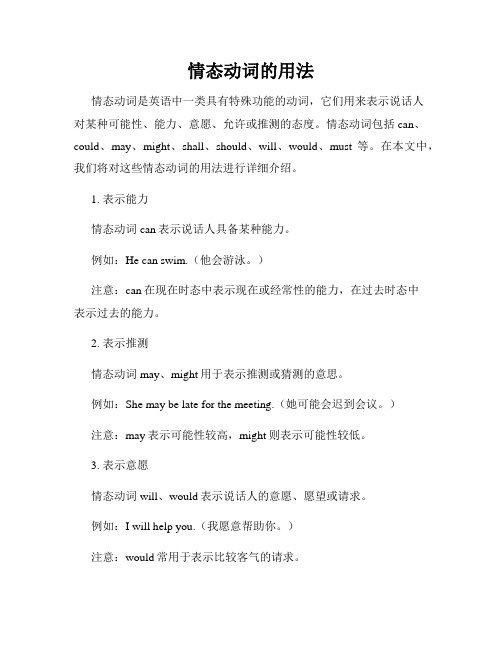
情态动词的用法情态动词是英语中一类具有特殊功能的动词,它们用来表示说话人对某种可能性、能力、意愿、允许或推测的态度。
情态动词包括can、could、may、might、shall、should、will、would、must等。
在本文中,我们将对这些情态动词的用法进行详细介绍。
1. 表示能力情态动词can表示说话人具备某种能力。
例如:He can swim.(他会游泳。
)注意:can在现在时态中表示现在或经常性的能力,在过去时态中表示过去的能力。
2. 表示推测情态动词may、might用于表示推测或猜测的意思。
例如:She may be late for the meeting.(她可能会迟到会议。
)注意:may表示可能性较高,might则表示可能性较低。
3. 表示意愿情态动词will、would表示说话人的意愿、愿望或请求。
例如:I will help you.(我愿意帮助你。
)注意:would常用于表示比较客气的请求。
4. 表示推测的过去情态动词must常用于表示对过去情况的推测或肯定。
例如:He must have missed the bus.(他肯定错过了公交车。
)注意:must用于表示对过去情况的肯定,而might用于表示对过去情况的推测。
5. 表示义务或必要性情态动词must表示对义务、必要性或确定性的肯定。
例如:You must finish your homework.(你必须完成作业。
)6. 表示建议或应该情态动词should表示建议或应该。
例如:You should go to bed early.(你应该早点睡觉。
)注意:should还可以表示对过去情况的推测,例如:He should have arrived by now.(他现在应该已经到达了。
)7. 表示允许或许可情态动词can与may可以用于表示许可或允许。
例如:Can I borrow your pen?(我可以借你的钢笔吗?)8. 表示可能性情态动词could用于表示可能性。

情态动词用法归纳总结情态动词是一类用来表示说话人的态度、观点和意愿的动词,具有一定的语法特点。
以下是情态动词的一些常见用法归纳总结:1.表示能力、可能性和推测:- Can: 表示能力和可能性,用于肯定句;例如:“I can swim.”(我会游泳。
)- Could: 表示能力和可能性,用于疑问句和否定句;例如:“Could you help me?”(你能帮助我吗?)- May/might: 表示可能性和推测;例如:“He may be busy.”(他可能很忙。
)- Must: 表示强烈的推测或肯定;例如:“He must be tired.”(他一定很累。
)2.表示许可和建议:- Can: 表示允许和禁止,用于肯定句;例如:“You can go now.”(你现在可以走了。
)- Could: 表示请求允许,用于疑问句和否定句;例如:“Could I borrow your pen?”(我可以借用你的笔吗?)- May/might: 表示请求允许;例如:“May I use your phone?”(我可以用一下你的手机吗?)- Should: 表示建议;例如:“You should eat more vegetables.”(你应该多吃蔬菜。
)3.表示义务和推测:- Must: 表示必须和义务;例如:“You must finish your homework.”(你必须完成作业。
)- Have to: 表示必须和义务;例如:“I have to go to work tomorrow.”(我明天必须去上班。
)4.表示可能性和意愿:- Can: 表示可能性和意愿,用于肯定句;例如:“I can help you with that.”(我可以帮你做那个。
)- Could: 表示可能性和意愿,用于疑问句和否定句;例如:“Could you please pass me the salt?”(请你把盐递给我好吗?)- May/might: 表示可能性和意愿;例如:“I may go to the party tonight.”(今晚我可能会去参加派对。

高中英语知识点归纳情态动词的用法与推测技巧高中英语知识点归纳:情态动词的用法与推测技巧在英语学习中,情态动词是一个重要的语法知识点。
情态动词包括can, could, may, might, shall, should, will, would, must, need, ought to等。
它们在句子中具有特殊的功能和用法。
本文将为大家介绍情态动词的用法和推测技巧。
一、情态动词的用法1. 表示能力和可能性Can和could常用于表示能力和可能性。
例如:- I can swim.(我会游泳。
)- He could run very fast when he was young.(他年轻时可以跑得很快。
)- It can be difficult to learn a new language.(学习一门新语言可能很困难。
)2. 表示请求、许可和建议情态动词can, could, may, might和will常常用于表示请求、许可和建议。
例如:- Can you help me with my homework?(你能帮我做作业吗?)- Could I borrow your pen?(我能借用你的钢笔吗?)- May I ask a question?(我可以提问吗?)- You should go to bed early.(你应该早点睡觉。
)3. 表示推测和可能性情态动词may, might, could和must用于表示推测和可能性。
例如:- He may be at home.(他可能在家。
)- She might pass the exam.(她也许会通过考试。
)- It could rain tomorrow.(明天有可能下雨。
)- He must be tired after running for so long.(他跑了这么久肯定累了。
)4. 表示义务和建议情态动词must和should常常用于表示义务和建议。

高中英语语法:情态动词的详解大总结一、can和could1、can的用法(1)表示体力和脑力方面的能力。
(2)表示对现在的动作或状态进行主观的猜测,主要用在否定句和疑问句中。
(3)表示可能性,理论上的可能性,意为“有时候可能会”,可用于肯定句。
(4)表示允许,意思与may接近。
(5)表示说话人的推测、怀疑、惊异、猜测或不肯定等,主要用于否定句、疑问句或感叹句中。
(6)can的特殊句型cannot…too / enough表示“无论怎么...也不过分”“越...越好”cannot but+ do sth.表示“不得不,只好”2、could的用法(1)表示能力,指的是过去时间。
(2)表示允许,指的是过去时间。
(3)表示可能,可以指过去时间,也可以指现在时间,表示语气缓和。
(4)委婉客气地提出问题或陈述看法,指的是现在时间。
主要用于疑问句,回答时用can。
3、can与could的区别can表推测时只用于否定句和疑问句(could无此限制)。
couldn’t的可能性比can’t小。
4、can与be able to的区别(1)现在时:无区别,但后者不常用。
(2)完成时;can没有完成时,此时要用have (has,had)been able to。
(3)将来时:can没有将来时,要用will be able to。
(4)过去时:could表示一般能力,was/were able to 表示在具体场合通过努力成功做成某事的能力。
二、may 和might1、may的用法(1)表示询问或说明一件事可不可以做。
(2)表示一件事或许会发生或某种情况可能会存在,通常用在肯定句和否定句中。
注意:表示可能性时,can’t语气强,表示“不可能”,may not语气弱,表示“可能不”。
2、might的用法(1)表示询问或允许,指的是过去时间。
(2)表示可能发生的事,可以指过去时间,也可以指现在时间,语气更加不肯定,可能性比may小一些。
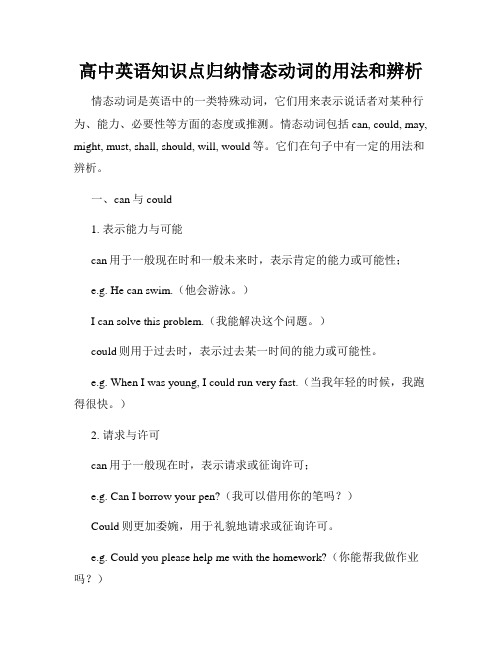
高中英语知识点归纳情态动词的用法和辨析情态动词是英语中的一类特殊动词,它们用来表示说话者对某种行为、能力、必要性等方面的态度或推测。
情态动词包括can, could, may, might, must, shall, should, will, would等。
它们在句子中有一定的用法和辨析。
一、can与could1. 表示能力与可能can用于一般现在时和一般未来时,表示肯定的能力或可能性;e.g. He can swim.(他会游泳。
)I can solve this problem.(我能解决这个问题。
)could则用于过去时,表示过去某一时间的能力或可能性。
e.g. When I was young, I could run very fast.(当我年轻的时候,我跑得很快。
)2. 请求与许可can用于一般现在时,表示请求或征询许可;e.g. Can I borrow your pen?(我可以借用你的笔吗?)Could则更加委婉,用于礼貌地请求或征询许可。
e.g. Could you please help me with the homework?(你能帮我做作业吗?)二、may与mightmay用于一般现在时和一般未来时,表示较正式的许可或征求对方意见。
e.g. May I use your phone?(我可以用你的电话吗?)might则表示过去或将来的一种可能性,常用于虚拟语气中。
e.g. If it rains tomorrow, we might stay at home.(如果明天下雨,我们可能会呆在家里。
)三、must1. 表示推测或推理must用于一般现在时和一般过去时,表示根据已有的客观事实或推理得出的合理推测。
e.g. He has been studying hard, so he must pass the exam.(他一直在努力学习,所以他一定会通过考试。
)2. 表示义务或必要性must用于一般现在时和一般过去时,表示说话者的主观认识或认为事物具有必然性或必要性。
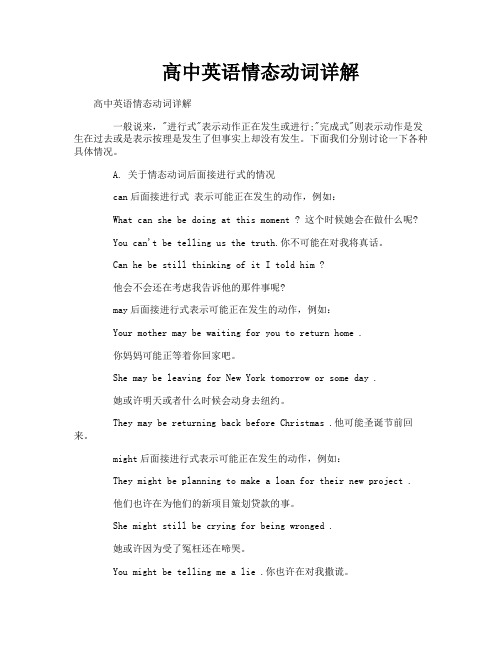
高中英语情态动词详解高中英语情态动词详解一般说来,"进行式"表示动作正在发生或进行;"完成式"则表示动作是发生在过去或是表示按理是发生了但事实上却没有发生。
下面我们分别讨论一下各种具体情况。
A. 关于情态动词后面接进行式的情况can后面接进行式表示可能正在发生的动作,例如:What can she be doing at this moment ? 这个时候她会在做什么呢?You can't be telling us the truth.你不可能在对我将真话。
Can he be still thinking of it I told him ?他会不会还在考虑我告诉他的那件事呢?may后面接进行式表示可能正在发生的动作,例如:Your mother may be waiting for you to return home .你妈妈可能正等着你回家吧。
She may be leaving for New York tomorrow or some day .她或许明天或者什么时候会动身去纽约。
They may be returning back before Christmas .他可能圣诞节前回来。
might后面接进行式表示可能正在发生的动作,例如:They might be planning to make a loan for their new project .他们也许在为他们的新项目策划贷款的事。
She might still be crying for being wronged .她或许因为受了冤枉还在啼哭。
You might be telling me a lie .你也许在对我撒谎。
must后面接进行式表示想必正在做某事,例如:You must be thinking where I learned it .你一定在想我是从哪儿知道这件事的。

高中英语情态动词详细讲解及例句-CAL-FENGHAI.-(YICAI)-Company One1一、情态动词无人称和数的变化,不能单独做谓语,只能和行为动词或状态动词构成谓语二、情态动词分为:情态助动词:can(could)、may(might)、must、have to (hadto )、ought to 、shall(should)、will(would) 12个半情态助动词:dare、need、used to、had better、would better(5个)三、情态助动词1.can and could1)ability:be able to do /manage to do/succeed in doing sth.eg.The army can defeat their enemy.eg.The army is able to defeat their enemy.eg.The army succeed in defeating their enemy.2)permission:eg.Can I smoke here?eg.You can’t smoke here.3)possibility:用在否定句、疑问句、感叹句中-eg.This can’t be done by him.当被用在肯定句中时,表达的是理论上的可能性,不涉及是否真的会发生eg.even expert drives can make mistakes.要表达现在或者将来的可能性,用may /might或could.eg.I may leave for Beijing next month.但在特殊疑问句中,或与副词hardly、only等连用的陈述句中表达可能性只用can/couldEg.where can the noise be coming from?eg.It can hardly be the postman,he comes only in the morning.4)有时会:the road can be blocked.5)could 表示轻微的怀疑或委婉的看法I’m sorry I couldn’t lend you the book now.His story could be true,but I hardly think it is.6)could 表示委婉的请求,主要用于疑问句,不用于肯定句Could you lend me some money?Yes,I can /No,I am afraid not.7)could 的常用结构:could+动词+比较级“非常,再.....不过了”It couldn’t be better.Couldn’t +过去分词+比较级“非常,再.....不过了”They couldn’t have tried harder to make me eel welcome.Can’t..too..=can never too“无论怎样...也不为过,越...越好”I can’t thank you too much.I owe my progress to you.Can’t (help/choose) but do/can but +动词原形“不得不,只好”We can but agree with him.Can’t help doing 忍不住,不得不I can’t help laughingCan’t be (it) 控制不住,没有办法It can’t be helpedCan’t....without 没有...就不能One can’t succeed without perseverance.2.may and might1)permission:May I use your pen?Yes,you may./No,you may not.2)Possibility:用于推测,表示不确定,不用于疑问句中She may know Tom’s address.出现I’m afraid.I’m not sure等表示不确定时,常用may/might.I’m afraid he might not come to attend the meeting today.从语气上判断,may表示的可能性比might 大,might更多的表示怀疑He may be very busy now.He might be very busy now.3)用于让步状语从句中However hard you may study,you cannot master English in a month.4)用于祈使句,表示祝愿May you succeed!5)might 常用于表示轻微的责备和委婉的请求You might post the letter for me if you are going near a post box.You might have let me know before!6)习惯用法:may as well do”理所当然,有足够的理由”She may be proud of her sonMay /might (just) as well do=had better do(最好)You might as well stay at home tonight.May/might as well+do A+as+do+B”与其做B不如做A”You might as well throw the money away as lend it to him.One may as well not know a thing at all as know it but imperfectly3.must and have to1)表示义务,一定要,必须You must arrive in good time.The meeting is very important.2)表示肯定性或难以避免,必然会,肯定会All men must die.3)must 表示有把握的推测,一定是,准时Must do/must be doing/must have doneThe tall fellow must be a basketball player.Let’s have something.You must be starving.He must have received mu letter which has mailed last week.4)must 表示非要,偏要,常以第二人称为主语,意指不耐或令人不愉快的事情,用于其他人称,表示主语固执,意为偏偏Why must you buy that car?Jane was never a pleasant young girl.After you gave her your advice,she must goand do the opposite.5)must 的三种否定形式表示不可能 must be --can’t be must have done--can’t have doneYou must have met him before.You can’t have met him before.表示不必 must do--need not to/don’t have toWe must get up at six tomorrow morning.We don’t have to get up at six tomorrow morning.表示决不能,严禁 must--mustn’tYou mustn’t park your car here.6)回答以must提问的句子Must we clean all the rooms?Yes ,you must/No ,you don’t have to/No ,you needn’t7)must 可做名词,表示必须有的东西,必须做的事Warm clothes are a must in the mountains.8)must和have to 表示必须时,有一下差别Must 表示的是说话人主观的看法,而have to则往往强调客观需要The play is not interesting ,I really must go now.I have to work when I was your age.Must 一般只表现在,have to 则有更多的时态。

高中语法专题解析情态动词的语气和语法功能情态动词是英语语法中的一类特殊动词,用来表示说话人的情感态度、意愿、推测等。
它不像一般动词具有时态和人称变化,并且不能单独作谓语,只能与动词原形搭配使用。
本文将对高中语法中的情态动词的语气和语法功能进行专题解析。
一、情态动词的语气情态动词的语气主要包括肯定、否定、推测、建议、命令、愿望、能力等。
下面我们逐一解析:1. 能力:can / could情态动词can / could用于表示能力。
can表示一般的能力,而could 则表示过去的能力或一种委婉的请求。
例如:- She can speak English fluently.(她能够流利地说英语。
)- Could you please lend me your pen?(你能借给我你的笔吗?)2. 推测:may / might / must情态动词may / might / must用于表示推测。
may和might表示可能性较大,而must则表示肯定性推测。
例如:- He may be at home now.(他可能在家。
)- She must have forgotten the meeting.(她肯定忘记了会议。
)3. 愿望:would like情态动词would like用于表示愿望或请求。
例如:- I would like to visit Paris someday.(我希望有一天能去巴黎旅游。
)4. 劝告:should / ought to情态动词should / ought to用于表示劝告或建议。
should用于一般情况,而ought to则带有更强的义务性。
例如:- You should finish your homework before watching TV.(你应该在看电视之前完成作业。
)- You ought to apologize for your mistake.(你应该为你的错误道歉。

情态动词用法归纳情态动词有can (could), may (might), must, have to, shall (should), will (would), dare (dared), need (needed), ought to 等。
情态动词无人称和数的变化;不能单独使用,必须与其后的动词原形构成谓语一、can, could1) 表示能力(体力、知识、技能)。
Can you lift this heavy box?(体力)Mary can speak three languages.(知识)Can you skate?(技能)此时可用be able to代替。
Can只有一般现在时和一般过去式;而be able to则有更多的时态。
I’ll not be able to come this afternoon.当表示“经过努力才得以做成功某事”时应用be able to,不能用Can。
如:He was able to go to the party yesterday evening in spite of the heavy rain.2) 表示请求和允许。
-----Can I go now?----- Yes, you can. / No, you can’t.此时可与may互换。
在疑问句中还可用could, might代替,不是过去式,只是语气更委婉,不能用于肯定句和答语中。
---- Could I come to see you tomorrow?---- Yes, you can. ( No, I’m afraid not. )3) 表示客观可能性(客观原因形成的能力)。
They’ve changed the timetable, so we can go by bus instead. This hall can hold 500 people at least.4) 表示推测(惊讶、怀疑、不相信的态度),用于疑问句、否定句和感叹句中。